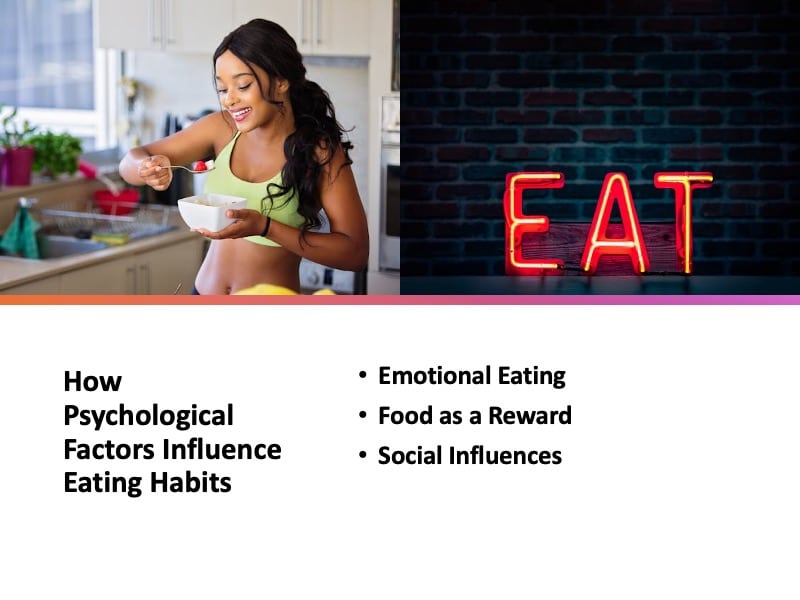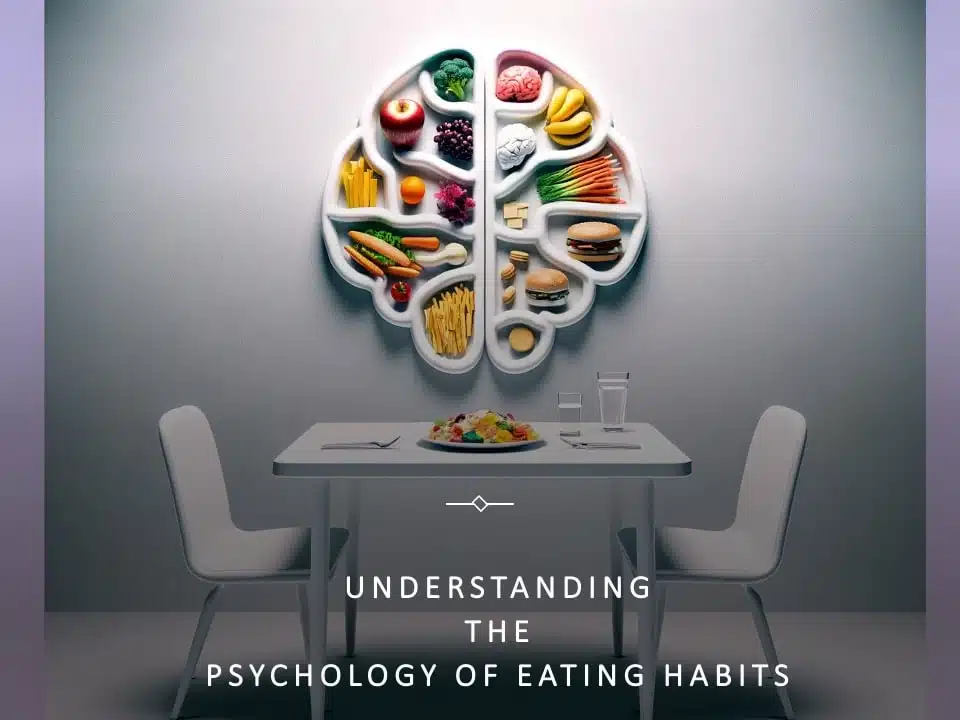The Psychology of Eating Habits & How to Develop Good Ones
The psychology of eating habits plays a crucial role in shaping food choices, portion control, and overall health.
While many people focus solely on what they eat, understanding why they eat the way they do is just as important.
Psychological factors such as emotions, mindset, and social influences can drive eating behaviors—both positive and negative.
Recognizing these underlying patterns is key to making sustainable changes, breaking unhealthy habits, and developing a healthier relationship with food.
What are Eating Habits?
Eating habits refer to the patterns and choices individuals make regarding food consumption—what, when, how, and why they eat.
These habits develop over time and are shaped by psychological, emotional, social, and environmental influences.
Why is it Important to Understand the Psychology of Eating Habits?
Understanding the psychology of eating habits is essential for developing a healthier relationship with food.
Eating is not just a biological necessity—it is deeply influenced by emotions, mindset, social norms, and learned behaviors.
Without awareness of these psychological factors, people may fall into cycles of emotional eating, unhealthy food rewards, or restrictive dieting that leads to frustration and setbacks.
By recognizing the mental and emotional triggers behind food choices, individuals can make more intentional, balanced decisions that support long-term health.
This knowledge also helps in breaking negative eating patterns, developing a growth mindset toward dietary changes, and ultimately improving overall well-being.
How Psychological Factors Influence Eating Habits

Eating behaviors are not solely driven by physical needs or nutritional knowledge.
Psychological factors play a crucial role in shaping our eating habits.
These include emotions, mental health states, cultural norms, and social environments.
Recognizing and addressing these psychological influences is crucial for developing and maintaining healthy eating habits, making the study of the psychology of eating habits a key component in nutritional education and behavioral change.
Emotional Eating
Emotional eating refers to the consumption of food in response to feelings rather than hunger.
Examples include eating comfort food when feeling sad or stressed or overeating due to boredom or loneliness.
This eating behavior is often a response to negative emotions and can be a coping mechanism for stress, anxiety, or depression (Van Strien, 2018).
Impact of Emotional Eating on Food Choices and Overall Health
Emotional eating often leads to choosing unhealthy, high-calorie foods, contributing to weight gain and associated health risks.
It can also create a cycle where emotions drive eating patterns, leading to further emotional distress.
Research has shown that emotional eaters are more likely to choose unhealthy snacks and meals, contributing to a higher risk of obesity and related health conditions (Konttinen et al., 2019).
How Can Anger Affect Eating Habits?
Among various emotions, anger can uniquely impact eating behaviors by increasing impulsivity or leading to mindless eating.
People may use food to self-soothe or distract from intense feelings of frustration, which often results in unhealthy food choices.
Food as a Reward
Using food as a reward is a common practice that begins in childhood and often persists into adulthood.
While it can feel harmless—like treating yourself to dessert after a tough day—it reinforces the emotional value of food and can subtly shape long-term eating behaviors.
This habit links food to achievement, comfort, or validation, which may undermine efforts to build a healthy and balanced relationship with eating.
How Rewarding Oneself with Food Affects Eating Behavior
Using food as a reward can establish a psychological association between food and emotional satisfaction.
This practice often involves high-sugar or high-fat foods, reinforcing unhealthy eating habits.
The brain’s reward centers are activated when consuming these types of foods, which can create a habit loop of seeking these foods for emotional comfort or as a reward (Macht, 2008).
Long-term Implications for Health and Well-being
Regularly using food as a reward can lead to overconsumption of unhealthy foods, increasing the risk of obesity, diabetes, and heart disease.
It may also hinder the development of healthier coping mechanisms for positive reinforcement.
This pattern of behavior can contribute to long-term health issues and may impact psychological well-being by reinforcing unhealthy eating habits.
Social Influences
The way we eat is shaped not just by personal preferences but also by the people around us.
Family traditions, cultural norms, and social interactions play a powerful role in shaping eating habits from an early age.
Whether it’s peer pressure, social gatherings, or shared dietary beliefs, these influences can encourage both healthy and unhealthy eating behaviors.
Understanding how social factors impact food choices is key to developing a balanced and mindful approach to eating.
The Role of Social Settings and Cultural Norms in Eating Habits
Social settings and cultural norms significantly influence eating behaviors.
Family traditions, cultural cuisine, and social gatherings often dictate what, when, and how much we eat.
These norms can shape our eating habits from a young age and can have lasting effects on our dietary choices (Higgs, 2015).
Peer Pressure and Eating Patterns
Peer pressure can impact eating habits, especially in group settings or social circles where certain types of foods are preferred or where there is a collective attitude towards dieting or indulgence.
This can lead to healthier or unhealthier eating behaviors depending on the social context.
The influence of peers can be significant, particularly among adolescents and young adults, where social acceptance can be tied to dietary choices (Salvy et al., 2012).
The Role of Mindset in Eating Behaviors
Your mindset plays a powerful role in shaping your eating habits.
The way you think about food—whether you view dietary changes as possible or impossible—can determine your success in building healthier habits.
A growth mindset fosters adaptability and encourages positive changes, while a fixed mindset can keep you stuck in unhealthy patterns.
Understanding this psychological factor is key to making lasting improvements in your relationship with food.
Fixed vs. Growth Mindset
A fixed mindset about eating believes that dietary habits and preferences are static and unchangeable.
For instance, someone might think, “I am just not someone who can enjoy healthy foods.”
In contrast, a growth mindset about eating involves the belief that one can develop and change one’s eating habits through effort and persistence.
An example is, “I can learn to appreciate the taste of vegetables with time.”
How Mindset Affects Food Choices and Dietary Habits
Mindset plays a crucial role in how individuals approach their dietary habits.
Those with a fixed mindset may feel powerless to change unhealthy eating habits, leading to a cycle of poor dietary choices.
On the other hand, individuals with a growth mindset are more likely to embrace challenges, such as trying new, healthier foods or altering portion sizes, and are generally more successful in maintaining healthy eating habits.
Cognitive Distortions and Eating Habits
The way we think about food can greatly influence our eating behaviors.
Cognitive distortions—irrational or exaggerated thought patterns—often lead to unhealthy eating habits, such as guilt-driven dieting or all-or-nothing thinking.
These mental traps can make it difficult to maintain a balanced relationship with food.
Recognizing and challenging these distortions is essential for developing healthier, more sustainable eating patterns.
Identifying Common Cognitive Distortions Related to Food
Common cognitive distortions include “all-or-nothing” thinking (e.g., viewing a diet as ruined after eating a single unhealthy item) and “catastrophizing” (e.g., thinking that eating something unhealthy will have disastrous health consequences).
Strategies to Overcome These Distortions
Overcoming these distortions involves recognizing and challenging irrational thoughts and replacing them with more balanced, realistic thinking.
Cognitive-behavioral strategies, such as thought recording and reframing, can be particularly effective (Cooper et al., 2010).
Which Action Would be Considered the Most Healthy Change to One’s Eating Habits?
The most impactful and healthy change to one’s eating habits is limiting or eliminating processed foods and focusing on whole, nutrient-rich options like fruits, vegetables, whole grains, and lean proteins.
Additionally, among the most beneficial changes is learning to eat with awareness and intention.
This shift not only improves food choices but also disrupts harmful automatic patterns tied to emotional or situational cues.
How to Stop Bad Eating Habits?
Stopping bad eating habits begins with identifying the psychological triggers behind them—such as stress, boredom, or emotional discomfort—and developing awareness of when and why they occur.
From there, reshaping your mindset and replacing automatic, unhealthy behaviors with intentional, health-supportive choices creates a sustainable path toward better eating patterns.
How to Develop Healthier Eating Habits

Changing your eating habits starts with awareness. Begin by identifying your triggers, setting realistic goals, and adopting mindful eating practices that help rewire your relationship with food.
Additionally, developing healthy eating habits involves more than willpower—it requires consistent, intentional actions such as planning meals, practicing portion control, and using self-monitoring tools.
Below are some tips that will make it easier to change your eating habits.
Mindful Eating
Mindful eating involves being fully present and engaged during eating, paying attention to the sensations of hunger and satiety, and noticing food’s flavors, textures, and smells. It is about eating with intention and attention.
Mindful eating can lead to better digestion, improved eating habits, reduced overeating, and greater enjoyment of food.
It has been shown to contribute to weight loss, reduced binge eating, and greater emotional well-being (Jordan et al., 2014).
Behavioral Modification Techniques
Behavioral Modification Techniques include self-monitoring (keeping a food diary), SMART Goals (specific, measurable, achievable, relevant, and time-bound goals), and utilizing reinforcement and rewards for meeting goals.
Role of Self-Monitoring, Goal Setting, and Feedback
Self-monitoring helps in becoming more aware of eating patterns and triggers.
Goal setting provides direction and motivation, and feedback (either self-generated or from a coach or support group) is crucial for making adjustments and celebrating progress (Forman & Butryn, 2015).
Meditation
Meditation can play a significant role in improving eating habits.
By enhancing mindfulness, meditation helps individuals become more aware of their eating triggers, feelings of hunger and fullness, and the sensory experience of eating.
This increased awareness can lead to more conscious food choices and a greater understanding of the body’s needs (Daubenmier et al., 2016).
Regular meditation practice can also help reduce stress and anxiety, which are common triggers for unhealthy eating behaviors like emotional eating or binge eating.
By cultivating a state of relaxation and present-moment awareness, meditation can help break the cycle of stress-related eating.
Additionally, meditation can help develop a non-judgmental attitude toward oneself, which is crucial for overcoming negative self-talk and guilt associated with eating (Katterman et al., 2014).
Techniques such as focused breathing, body scan meditation, and mindful awareness during meals can be incorporated into daily routines.
For example, practicing a short breathing meditation before meals can help center the mind and body, leading to more mindful eating.
Similarly, a body scan meditation can assist in recognizing true hunger signals and differentiating them from emotional hunger.
Studies have shown that mindfulness meditation can lead to reductions in binge eating, emotional eating, and weight loss.
Participants in mindfulness meditation programs often report better control over their eating behaviors and an improved relationship with food (O’Reilly et al., 2014).
Education
Improving your nutrition education can dramatically increase your ability to develop healthier eating habits.
When you learn why certain foods benefit your body and how to prepare them in enjoyable ways, healthy eating becomes more intuitive and sustainable—not just another diet to follow.
Cooking classes, whether in person or online, can introduce you to creative and flavorful methods for preparing whole foods, making meals more satisfying and less reliant on ultra-processed options.
Likewise, taking a basic nutrition course—available through community centers, universities, or online platforms—can clarify important concepts like creating a well-balanced diet, portion control, macronutrient balance, and reading food labels.
Education reduces confusion, empowers decision-making, and builds confidence in your food choices.
The more you understand nutrition, the easier it becomes to align your eating habits with your health goals.
Final Thoughts: Are Psychology and Eating Habits Connected?
Understanding the psychology of eating habits is fundamental to developing effective strategies for improving health and well-being, and this field of study illuminates the complex interplay of psychological factors in shaping dietary behaviors.
Additionally, continued research in nutritional psychology is vital for deepening our understanding of this relationship.
Moreover, encouraging individuals to become more aware of their eating habits and psychological influences can lead to more informed and healthier food choices.
For the improvement of society as a whole, an integrative approach combining psychological, nutritional, and social perspectives is encouraged for a more comprehensive understanding and management of eating habits.
Read Next: 10 Essential Habits for a Healthier, Happier Life
This website does not provide medical advice. This website site does contain affiliate links, and purchases may earn a commission.
Read my Medical Disclaimer, Review Disclaimer, and Publishing Policies for more details. Use of this site indicates acceptance of these terms.



